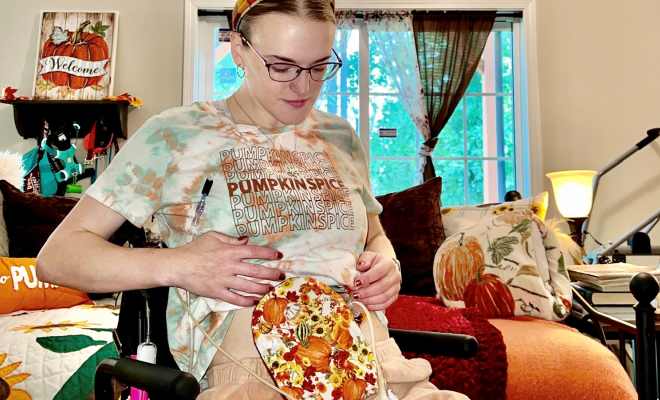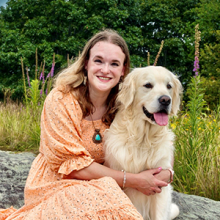A blockage in the small intestine, called meconium ileus, was the medical complication that led to my cystic fibrosis diagnosis at birth. For years, I struggled with failure to thrive due to malabsorption as my pancreas was damaged from CF. Life with digestive problems isn’t easy, and I’ve taken many turns in my journey to find the right solutions and coping strategies for me.
When I was 2, I had a G-tube placed for supplemental nutrition, which I used for 11 years. I finally began to absorb some regular food, took pancreatic enzymes, and had only a few spats of intestinal blockages over the years, but nothing that was unmanageable. However, when I was about 17 years old, I began to have episodes of more severe intestinal blockages called Distal Intestinal Obstruction Syndrome (DIOS), which only affects a small percentage of the CF population. DIOS led to many painful procedures, worse GI issues from medications, and hospital stays, due to the severity of my illness and the risk of intestinal rupture.
At age 22, my upset stomach, difficulty swallowing, intestinal blockages, and nausea/vomiting worsened greatly, and we ran out of treatment options. I pursued care from a gastrointestinal motility specialist who confirmed my rare, but serious complications from CF. After many invasive tests, I was diagnosed with malabsorption, a 92% paralyzed esophagus, gastroparesis, small intestinal dysmotility, and colonic dysmotility. We tried multiple motility medications, but, sadly, they were ineffective, and I also struggled to absorb them. With the increasing severity of my digestive system failure and sickness from it, a single, difficult treatment option was presented: an ileostomy — a surgical procedure that would bring the end of my small intestine out through an opening in my abdomen, forming a stoma.
I knew nothing about ostomies, so this option terrified me, yet simultaneously provided hope as a way out of some of the horrors of my digestive system.
I agreed to get a loop ileostomy and had surgery in October 2020. I experienced a horrific post-surgery ileus where my intestines stopped working and only put out a black tar-like substance for five days — which just proved how necessary an ostomy was for my body. Once I recovered from the ileus and surgery, it was smooth sailing with only a few hiccups along the way. My extreme bloating decreased significantly, my cystic acne cleared, my abdominal pain ceased, and my quality of life improved.
Unfortunately, a few months after surgery, I began to experience symptoms of diversion colitis — a rare complication of ileostomy placement. It did not respond to colitis medicine, and I went through spasming pain and internal bleeding daily. In July 2021, I had a total colectomy where my large intestine was removed. A J-tube was placed simultaneously as I had failed G-tube feeds due to my gastroparesis, malabsorption, and malnutrition. Ultimately by fall 2022, I had failed J-tube feeds, experienced countless complications, and became extremely malnourished to the point where my bones were showing.
In January 2023, I was finally put on total parenteral nutrition (TPN), which is intravenous nutrition. Sadly, I had to fight with doctors for this medical intervention and was abused medically. But my family and I advocated for my needs, and I am grateful to be back on the right track nutritionally. TPN has been life changing. It provides me with the necessary nutrients, helps me maintain a healthy weight, gives me a little more energy, and stabilizes my body overall. It has highly undesirable side effects that I deal with, but the nutritional value of TPN helps counterbalance these issues.
Coping with a stoma — especially as a young lady — can be challenging. Here are my best tips for coping:
- Name your stoma. A lot of ostomates name their stoma to help break the ice of having an ostomy. Mine is named Rosie, as the stoma looked like a perfect red rose immediately after surgery.
- Don’t stay at home. Even if you are afraid to go out in public with your ostomy, force yourself to go out to the store, a friend’s home, the park … just go somewhere. Three weeks after my ostomy surgery, I went to a relaxed Halloween dinner party with some of my closest friends, and I’m so glad I did. It helped me realize it was okay to live life with an ostomy and break out of my shell of self-consciousness around others.
- Tell those in your circle about your ostomy and educate them. Telling my friends and coworkers about my ostomy has helped me be more comfortable around them and feel that it’s okay to ask for help if I experience ostomy troubles.
- Buy ostomy pouch covers from Etsy or Facebook groups. These covers will help increase body confidence and conceal the contents of the pouch if your shirt slips. I have covers ranging from sparkly Paris to adorable Christmas nutcrackers to elegant black lace — and my doctors, nurses, and fellow ostomates love them.
- Go shopping for new wardrobe pieces that help you feel confident with your ostomy. An ileostomy is a major adjustment for anyone, and clothes will fit differently once an ostomy is placed. Besides, no one ever objected to a little retail therapy! Personally, I’m a dress lover, and they’re comfortable to wear with an ostomy.
I’m approaching three years with my ileostomy, two years with my colectomy, and one year on TPN. Digestive system failure is a growing challenge in CFers with little research and options for treatment. I hope my story will spread awareness of the need for gastrointestinal-focused treatments and motivate others to advocate for the care they need.
Life with digestive system problems is difficult, but not impossible. Jesus is strong enough to uphold me in times of trials, and I am thankful for the support of my family and friends through all my health challenges. I have found that encouraging fellow chronic illness warriors and educating others is a powerful way to turn my health issues from negative to positive. I’ve always said, “If you can’t find the silver lining, make one!”


